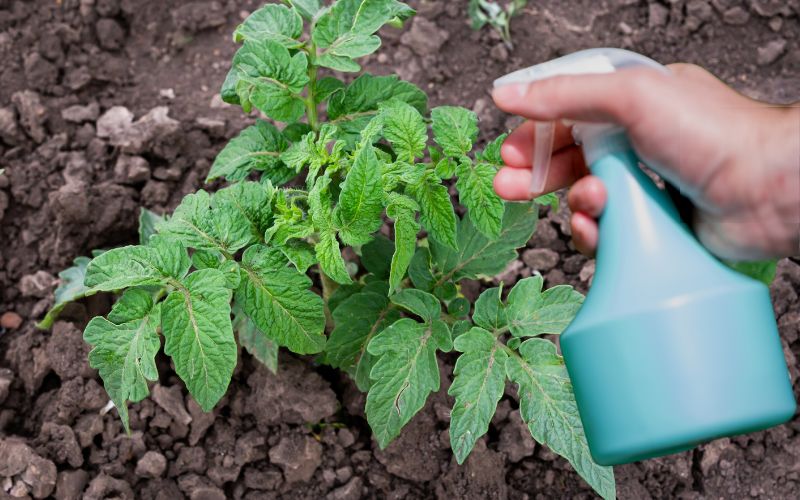Garlic is commonly found around the kitchen but is highly effective in controlling garden pests. Using garlic for pest control is easy and very safe for humans and pets, and at low concentrations is not toxic for most vegetable plants.
In this article, we dig deeper into why garlic is so effective and how you can use garlic for pest control in your own home vegetable garden.
Benefits of using garlic for pest control
The benefit of using garlic for pest control lies in its ability to repel a wide range of pests and also that, unlike some other organic pesticides, garlic has been proven to be safe for beneficial insects.
Garlic repels a large range of pests
It’s not just vampires that are repelled. Garlic can be used to repel and potentially kill smaller pests, such as mites, aphids, moths, beetles, and spider mites. Garlic is also an effective repellent against slugs and snails, as well as larger pests, such as mice and squirrels.
Garlic extract can also be added directly to the soil to control nematodes. Raw garlic straw extracts when used in combination with plastic film covering and rabbit manure were effective at controlling root-knot nematodes that affected tomato plants grown in pots and its action resulted in a better tomato harvest.
Garlic doesn’t affect beneficial insects
One of the main advantages of using garlic for pest control is that it doesn’t harm beneficial insects, such as ladybugs, spiders, or bees.
A field study was conducted in Ghana to study the effect of garlic extracts on flea beetles and whiteflies found on eggplant and okra plants. The garlic extract reduced the number of flea beetles and whiteflies found on these plants to levels that were not harmful to the plant. At the same time, ladybugs and huntsman spiders that are natural enemies of these pests remained unharmed on these plants.
Similarly, another study conducted in Ghana found that homemade garlic extract could control important cabbage pests, including diamond black moths, aphids, cabbage beetles, and whiteflies, but did not harm ladybugs, hoverflies, or spiders.
Because garlic doesn’t affect the beneficial predators of the pests that it repels or kills, the beneficial predators become even more effective at controlling the pests.
For example, a study conducted on tomato plants grown in a greenhouse found that garlic extract reduced the number of whiteflies, while a tiny parasitic wasp of whiteflies (Eretmocerus eremicus) remained unaffected and controlled the whiteflies even further. These parasitic wasps lay their eggs in whitefly larvae and their young feed on the whitefly larvae once they hatch.
Other beneficial effects of garlic
Apart from being a non-toxic but effective method of pest control, garlic can provide your vegetable plants with additional benefits as well.
Garlic protects plants from diseases
Due to its bactericidal and fungicidal activity garlic can also protect your vegetable plants from various bacterial and fungal diseases.
Garlic stimulates plant growth
When garlic extracts were used on zucchini plants that were under attack from pests and pathogens, the garlic extract did much more than just repel these pest insects and protect the plant from diseases. Garlic extract also stimulated plant growth and increased the production of these zucchini plants.
Using garlic for pest control
Garlic can be used for pest control by either making a garlic extract spray or by companion planting with garlic
Garlic pest repellent spray

Garlic pest repellent spray can be easily made at home by adding about 25 g of chopped garlic into 10 L of water. This solution can either be left for a few hours or boiled. Then you can add the solution into a spray bottle and spray it directly on pests to kill or repel them or on your plants to repel and prevent pest infestations.
Despite being safe, it’s best to avoid flowers on your plants as the spray could damage their delicate structure.
Garlic as a companion plant

Garlic is an ideal companion plant for almost all types of vegetable plants, other than legumes (see below). Companion planting with garlic is ideal for keeping all sorts of pests away. Most slugs and snails avoid garlic plants, while mice and squirrels may try nibbling on them but will never come back for more.
The small size of the plant makes it ideal even to be grown even in containers along with other vegetable plants that you need to protect from pests.
Garlic when grown as a companion plant secretes chemicals both from its roots and well as its leaves, offering other vegetable plants grown near it protection from pests and diseases. Garlic will promote plant growth when used as a companion plant as well.
Keep garlic away from legumes!
Just a word of caution. Garlic extracts should not be used on legumes, either on the leaves or on the soil around the plant. In addition, garlic and other plants of the Allium family, such as onion, should not even be grown near legumes, and legumes should not be grown where alliums have recently been grown.
This is because the chemicals secreted by these plants have a negative effect on the formation and growth of root nodules in the legumes, which in turn affects the growth of these plants. Root nodules are where the nitrogen-fixing bacteria that are found in legumes live.
Garlic either as a homemade repellent spray or as a companion plant can effectively repel and keep a range of pests away from your vegetable garden. In addition to pest control, garlic can also protect your plants from diseases and promote growth. Garlic can be used on all types of vegetables except legumes.


This was a great read